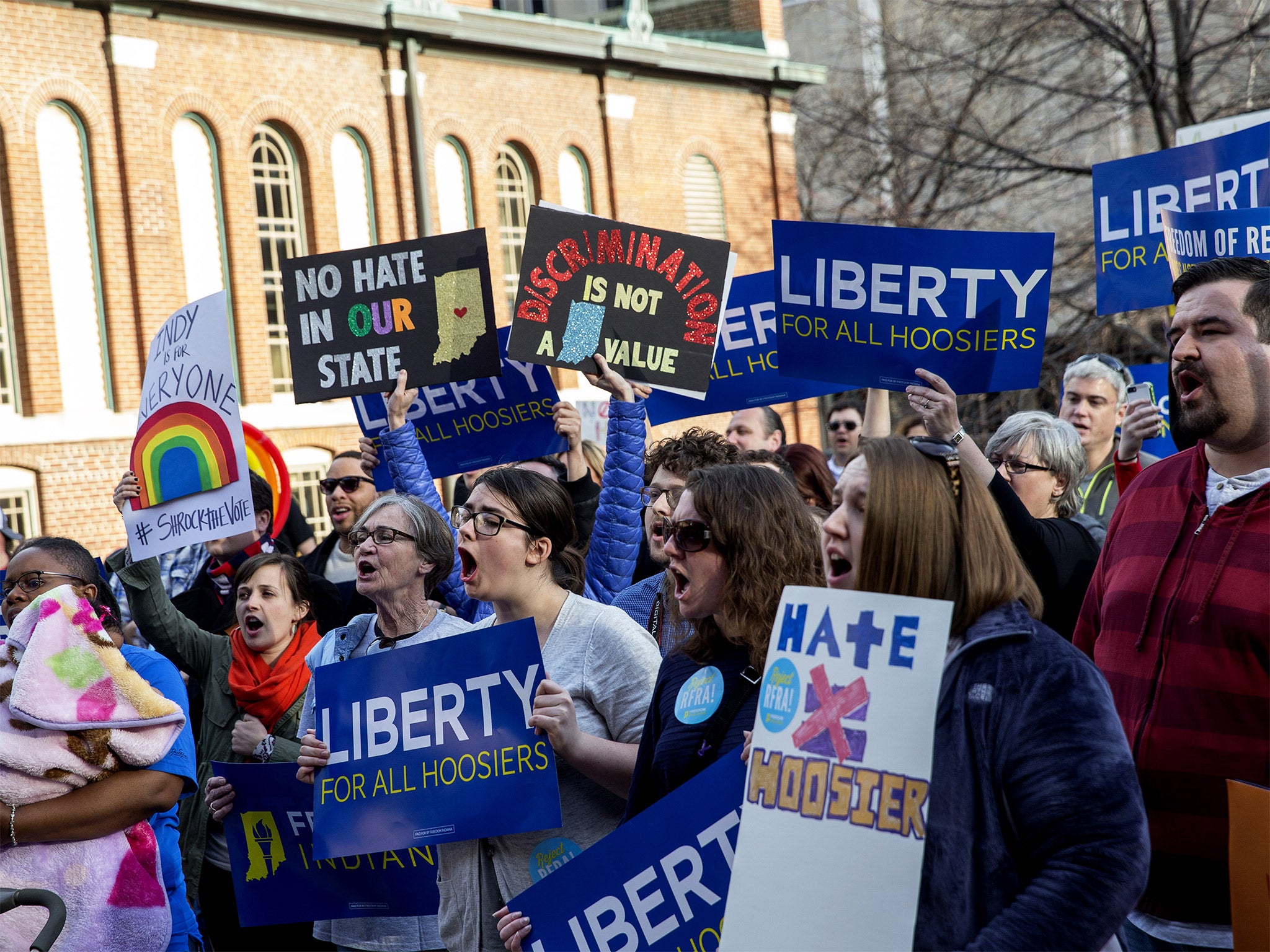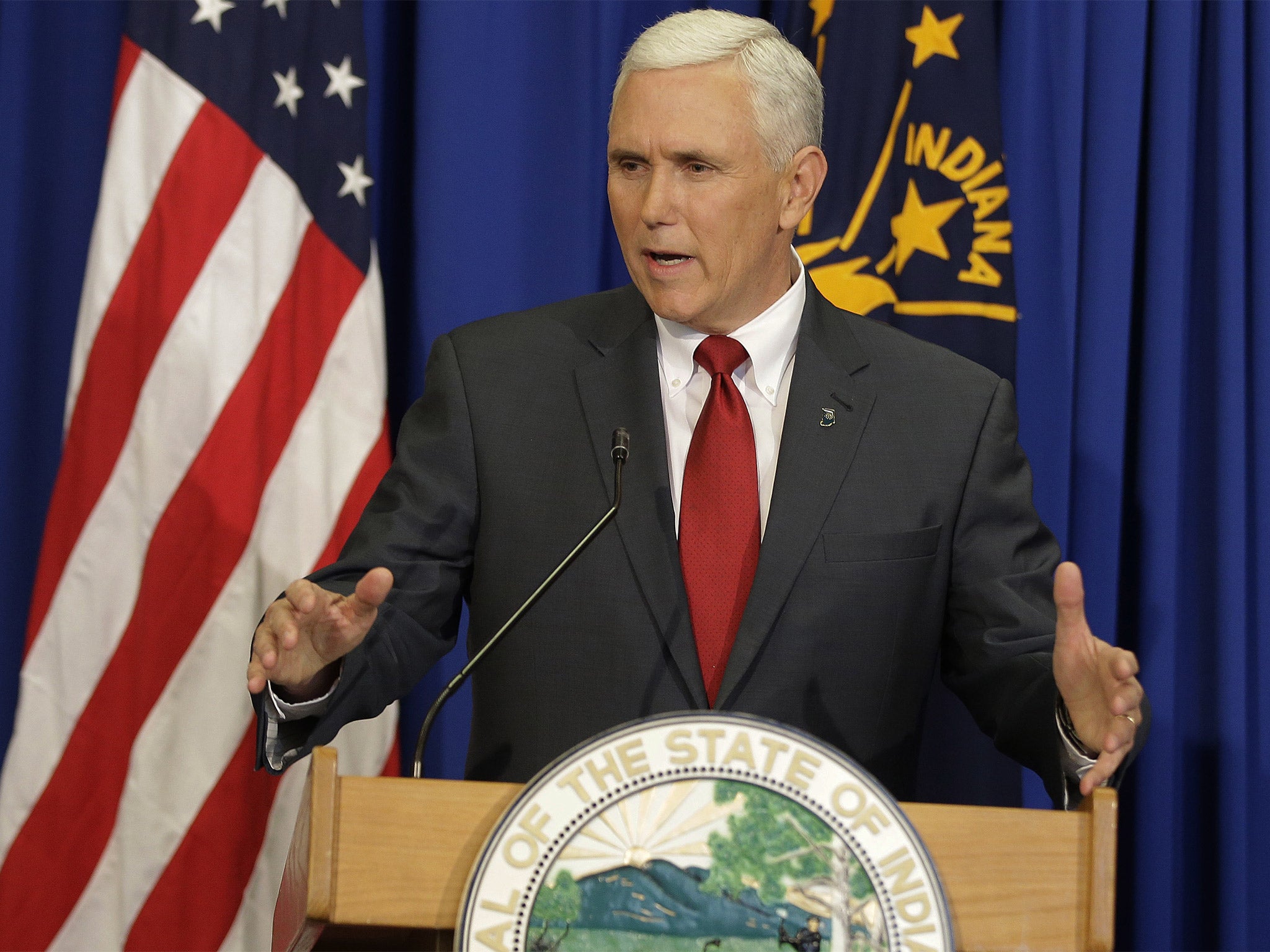Indiana moves to clarify new religious-freedom law following criticism that it discriminates against LGBT people
Several major companies have threatened to avoid doing business in the state because of the measure, with Apple CEO Tim Cook describing it as 'dangerous'

Your support helps us to tell the story
From reproductive rights to climate change to Big Tech, The Independent is on the ground when the story is developing. Whether it's investigating the financials of Elon Musk's pro-Trump PAC or producing our latest documentary, 'The A Word', which shines a light on the American women fighting for reproductive rights, we know how important it is to parse out the facts from the messaging.
At such a critical moment in US history, we need reporters on the ground. Your donation allows us to keep sending journalists to speak to both sides of the story.
The Independent is trusted by Americans across the entire political spectrum. And unlike many other quality news outlets, we choose not to lock Americans out of our reporting and analysis with paywalls. We believe quality journalism should be available to everyone, paid for by those who can afford it.
Your support makes all the difference.Indiana Governor Mike Pence sought today to quell the growing storm of controversy over his state’s new religious-freedom law, saying legislators would add a clarification to the measure this week, to spell out that it does not permit discrimination against gay people. “We will fix this and we will move forward,” Mr Pence said at a press conference in Indianapolis, the state capital.
Facing a fierce backlash from inside and outside Indiana, the governor defended the new law, known as the The Religious Freedom Restoration Act (RFRA), which limits any other legislation that might “substantially burden” a person or institution’s freedom to adhere to their religious beliefs.
Critics say the measure will allow businesses to turn away LGBT people on religious grounds. Mr Pence, a Republican, argued that the law had been “smeared” by the national media, whom he accused of “sloppy reporting”. Nevertheless, he said, “It would be helpful to move legislation this week that makes it clear that this law does not give businesses a right to deny services to anyone.”
Since Mr Pence signed the law last Thursday, several major companies have threatened to avoid doing business in Indiana, with Apple CEO Tim Cook describing the measure as “dangerous”. The National Collegiate Athletic Association (NCAA), which oversees college sports in the US, is based in Indianapolis. Its president Mark Emmert said the organisation was “concerned about how this legislation could affect our student-athletes and employees.”

On Monday the Republican mayor of Indianapolis, Greg Ballard, issued an executive order forbidding businesses that receive city funds to discriminate against LGBT people. “Discrimination is wrong,” Mr Ballard said. “I hope that message is being heard loud and clear at our statehouse.”
Indiana’s anti-discrimination laws currently cover racial discrimination but, under the front-page headline “Fix This Now”, the state’s biggest newspaper, The Indianapolis Star, today demanded they be widened to include discrimination based on a person’s sexual orientation or gender identity. Mr Pence said at the weekend that such a measure was “not on [his] agenda.”
Today, Mr Pence insisted that he “abhors discrimination” and said RFRA was in fact intended to “promote tolerance”. The people of Indiana, he added, “are a loving, kind, generous, decent and tolerant people – and I’m just one of them.”
During the lengthy press conference, the governor, who had previously been floated as a potential candidate for the 2016 GOP presidential nomination, emphasised his personal anti-discrimination credentials, recalling how he had met with civil rights leaders in Montgomery, Alabama, on the anniversary of Bloody Sunday. “The Reverend Martin Luther King Jr was one of my heroes in my youth,” Mr Pence said. “He’s one of my heroes today.”
Join our commenting forum
Join thought-provoking conversations, follow other Independent readers and see their replies
Comments